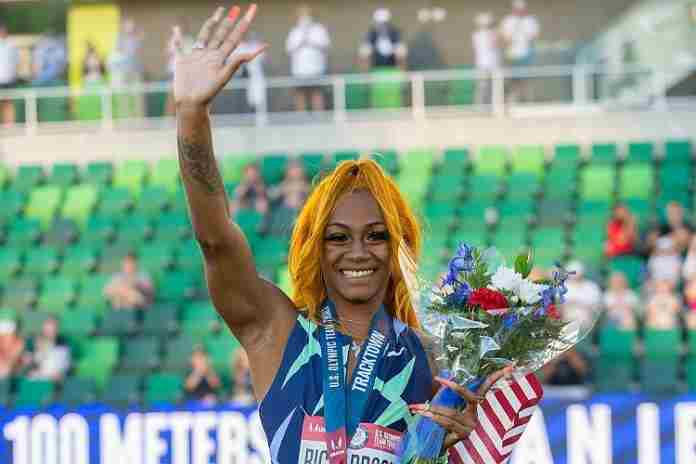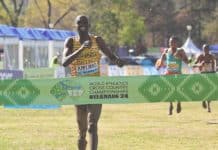
(★ Friends: Thank you! Now 26 donors have covered 32% of our new bill for server and support costs. Your help is needed: please donate here. Your enthusiasm is why this site continues. Thank you. ★)
The latest news, notes and quotes from the worldwide Five-Ring Circus:
● Games of the XXXII Olympiad: Tokyo 2020 ● The International Olympic Committee’s Executive Board adopted a five-page set of guidelines to Olympic Charter rule 50.2 concerning protests and demonstrations at the Tokyo Games that maintains most restrictions, but opens a new opportunity.
What’s clear is that most of the old restrictions still apply. “Expressions are not permitted in the following instances:
● “During official ceremonies (including Olympic medal ceremonies, opening and closing ceremonies)
● “During competition on the field of play
● ”In the Olympic Village.”
What is new is “expression” in a new forum:
“On the field of play prior to the start of the competition (i.e. after leaving the ‘call room’ (or similar area) or during the introduction of the individual athlete or team) provided that the expression (for example, gesture) is:
“I. consistent with the Fundamental Principles of Olympism;
“II. not targeted, directly or indirectly, against people, countries, organisations and/or their dignity;
“III. not disruptive (by way of example only, the following expressions are considered disruptive: expressions during another athlete’s or team’s national anthem and/or introduction, as this may interfere with such other athlete’s or team’s concentration on and/or preparation for the competition; physical interference with the introduction of another athlete or team or the protocol itself (for example by unfurling a flag, a banner etc.); causing (or assuming the risk of causing) physical harm to persons or property, etc.); and
“IV. not prohibited or otherwise limited by the rules of the relevant National Olympic Committee (NOC) and/or the competition regulations of the relevant International Federation (IF).”
The regulations further explain that “It should be recognised that any behaviour and/or expression that constitutes or signals discrimination, hatred, hostility or the potential for violence on any basis whatsoever is contrary to the Fundamental Principles of Olympism.”
There is a procedure for discipline, which includes the right to a hearing, but with sanctions to be handled by the IOC itself, not by another party, such as a National Olympic Committee or International Federation.
Today’s posting of these guidelines was a surprise is that it did not come from the IOC’s Legal Affairs Commission as had been indicated earlier, but from the IOC and its Athletes’ Commission, chaired by swimming gold medalist Kirsty Coventry (ZIM).
Observed: This is really clever and allows the IOC to claim, correctly, that it has loosened its rules, but in such a narrow forum as to limit the impact of any demonstrations or protests in most of its sports.
The time for on-field egress and introductions is short and for those interested in protesting, the attention of the television cameras is what’s important. Introductions on television in the most popular sports – swimming, gymnastics and athletics – are usually just a few seconds long and are at a time when the athletes are most concerned about their competitions. Maybe a few gloves with embroidered slogans will be worn. There may be more opportunities in team sports, but this will also depend on how the teams will actually be introduced in Tokyo.
This is a much more compact forum than the two-plus minutes of a national anthem on the awards podium, or during the hour-plus march into the stadium during the Opening Ceremonies.
Rest assured, however, there will be those who will challenge these guidelines, but the IOC has set up a fairly clear process and promises a proportionate response to any violations. Whether this works or not is yet to be seen, but once again, the IOC has shown it is not to be underestimated in creating an innovative solution to a difficult issue that allows more flexibility but also limits its exposure to difficulties.
¶
The question of spectators and Tokyo is up for grabs again, as reports surfaced of another review next week about whether spectators should be allowed.
The coronavirus infection rate is the prime issue and Tokyo continues under a state of “quasi-emergency” that will expire on 11 July. A new lottery for ticket holder has been completed, which will reduce total attendance to 2.72 million at the Games, or about 35% of capacity.
¶
Kyodo News reported that 10 U.S. news organizations have protested restrictions on interviews of spectators and other regulations as a “clear overreach” since Japanese domestic media will not have the same restrictions.
Their request is for “routine newsgathering” to be allowed as long as media observe masking and distancing requirements. The report noted that about 4,600 foreign media are expected for the Games now, about half of the original number.
Kyodo noted, “The committee later said it had sent a reply to the editors seeking their understanding over the restrictions.”
● Athletics ● “USADA announced today that Sha’Carri Richardson, of Clermont, Fla., an athlete in the sport of track and field, has accepted a one-month suspension – as permitted under the applicable international rules – for an anti-doping rule violation for testing positive for a substance of abuse.
“‘The rules are clear, but this is heartbreaking on many levels; hopefully, her acceptance of responsibility and apology will be an important example to us all that we can successfully overcome our regrettable decisions, despite the costly consequences of this one to her,’ said USADA CEO Travis T. Tygart.”
Richardson tested positive for marijuana at the Trials on 19 June, after winning the women’s 100 m in sensational fashion in 10.86. The rules are quite clear:
“The 2021 World Anti-Doping Code newly classifies THC as a “Substance of Abuse” because it is frequently used in society outside the context of sport. If an athlete who tests positive for a Substance of Abuse establishes that their use of the substance occurred out of competition and was unrelated to sport performance, the athlete will receive a three-month sanction. However, if the athlete satisfactorily completes a Substance of Abuse treatment program approved by USADA, the sanction may be further reduced to one month.”
This is the third such sanction issued in 2021 for this kind of violation; Kahmari Montgomery, former U.S. champion in the men’s 400 m, received the same sanction from 30 April 2021.
For Richardson, her sanction began on 28 June, the date she was provisionally suspended. However, her results from the Trials “have been disqualified, and she forfeits any medals, points, and prizes. Beyond the one-month sanction, athlete eligibility for the Tokyo Games is determined by the USOPC and/or USA Track & Field eligibility rules.”
This means her win at the Trials in the 100 m is voided and Javianne Oliver is the winner (10.99), followed by Teahna Daniels (11.03) and now Jenna Prandini (11.03), who finished fourth. The USA Track & Field selection rules require that the top three finishers in each event at the Trials – if they have met the Olympic qualifying standard – go to the Games.
Interestingly, however, the women’s 100 m in Tokyo starts on 30 July … after her sanction is over! Richardson could be entered in the 4×100 m if desired; that’s up to USA Track & Field and the U.S. Olympic & Paralympic Committee.
Richardson said she used marijuana to cope with grief from the death of her biological mother.
¶
The Court of Arbitration for Sport also knocked Rio Olympic 100 m hurdles Champion Brianna McNeal (USA) out of the Tokyo Games, finding that she “had committed an Anti-Doping Rule Violation (ADRV) pursuant to Article 2.5 of the 2019 WA Anti-Doping Rules (‘Tampering or Attempted Tampering with any part of Doping Control’) and a five-year period of ineligibility beginning on 15 August 2020 was imposed on her.”
With her appeal of the World Athletics suspension continuing, McNeal was allowed to run at the U.S. Olympic Trials and finished second to Keni Harrison in 12.51. Fourth-placer Gabbi Cunningham (12.53) is the expected replacement.
¶
The women’s 400 m in Tokyo also received a shock with the withdrawal of Namibian sensations Christine Mboma – the world leader and World U-20 record holder – and Beatrice Masilingi due to testosterone levels too high to all competing in the women’s division in races from 400 m to the mile.
This is the same issue which has sidelined 800 m stars Caster Semenya (RSA), Francine Niyonsaba (BDI) and Margaret Wambui (KEN) for “differences in sex development.”
Both are shown as eligible in the 200 m, which is not covered by the World Athletics regulations for DSD. Mboma ran a world-leading 48.54 time at the Szewinska Memorial in Poland on 30 June and Masilingi ran 49.53 in the Namibian Championships on 11 April, ranking no. 3 on the 2021 world list.
Defending Olympic champ Shaunae Miller-Uibo (BAH) has indicated she will run only the 200 m in Tokyo since the 400 m heats and the 200 m final are on the same day. This leaves the 400 m field open with Jamaica’s Stephenie Ann McPherson (49.61) and American Quanera Hayes (49.78) the fastest eligible entries, with Allyson Felix (50.02) at no. 5.
¶
The Court of Arbitration for Sport has found Salwa Eid Naser (BRN), the 2019 World Championships women’s 400 m gold medalist guilty of an anti-doping violation and suspended her for two years effective 30 June 2021, but to conclude in about 14 months after counting her provisional suspension from June to October of 2020.
Naser, now 23, was penalized for whereabouts failures, including a comical situation in which she gave the wrong address to a doping control testing officer, who then almost found her, but failed to do so. A World Athletics Disciplinary Tribunal finding that she was not responsible was overturned.
She could be eligible to return in time for the 2023 World Championships in Budapest.
¶
Norwegian star Karsten Warholm was pretty happy with his world-record win at the Bislett Games in Oslo on Thursday:
“I knew that I had a fast time in my body; it feels like it as been there for a long time but you never know when it is right to do it. And it is one thing to know you have it in you and another to go out and do it.
“It is very special to do it here in Bislett in front of a great crowd including my friends and family. This is my first 400 m hurdles of the season so I really think there is more in the tank.
“It might take another world record to win the Olympics. There are such a lot of great guys out there at the moment who will all be aiming to do it and win gold. I am happy that there is such great competition.”
● Cycling ● The Tour de France has continued without significant incident this week, with a big move made during Stage 5 by defending champion Tadej Pogacar (SLO).
After falling behind race leader Mathieu van der Poel (NED) by 39 seconds after stage 4, Pogacar turned on the jets during the Stage 5 individual time trial and won the 27.2 km flat route, timing 32:00, 19 seconds ahead of everyone else. He ended the day second by just eight seconds.
Stage 6 was another sprinter’s course, a flat, 160.4 km route finishing in Chateauroux. Once again, it was Britain’s Marc Cavendish, 36, who got to the line first, winning his 32nd career stage at the Tour, two short of the all-time record by Eddy Merckx (BEL). Cavendish out-lasted Belgian Jasper Philipsen and Frenchmen Nacer Bouhanni and Arnaud Demare.
On Friday, the route from Vierzon to Le Creusot was a hilly, long, 249.1 km test with most of the action in the final third. Slovenia’s Matej Mohoric broke away from the peloton with 18 km left and got his first career Tour de France stage win in 5:28:20. He finished 1:20 up on Jasper Stuyven (BEL) and 1:40 up on Dane Magnus Cort, van der Poel and four others.
That left van der Poel still in the yellow jersey, now 30 seconds up on Belgian star Wout van Aert, 1:49 ahead of Kasper Asgreen (DEN), then 3:01 ahead of Mohoric and 3:43 up on Pogacar, who finished 5:15 back on the stage.
¶
The female spectator who caused a massive crash on the first stage of the Tour by holding up a sign for the television cameras has been arrested and will be tried in October.
The 30-year-old French woman turned herself in on Wednesday and was arrested and placed in custody by the French authorities. The local prosecutor told reporters that she woman was contrite.
The Tour organizers had threatened to sue her, but withdrew the threat. Reports indicate that the criminal process could result in a fine of €1,500 (roughly $1,781) fine for involuntarily causing injury and putting the life of others at risk.
● Football ● The U.S. women’s National Team continued its prep for Tokyo with a convincing 4-0 victory over Mexico on Thursday evening in East Hartford, Connecticut.
Sam Mewis opened the scoring 21 minutes into the first half and Christen Press added a second goal at the 39-minute mark for a 2-0 halftime lead. Tobin Heath, returning from months of injuries, scored in the 74th minute and Press got a final goal in the 85th.
The U.S. had 58% of the possession in the game and enjoyed a 27-5 edge on shots; Alyssa Naeher and Adrianna Franch each played a half in goal for the American women. The U.S. extended its unbeaten streak to 43 games
The U.S. women have one more tune-up match against Mexico next Monday, also in East Hartford, before heading to Tokyo. The U.S. women are 38-1-1 all-time vs. Mexico.
● Water Polo ● The U.S. battled Montenegro to the end, but came up short, 9-8, in the FINA men’s World League Super Final in Georgia.
The two came out of the same group, with Montenegro beating the U.S., 10-6, in their opening match. But both moved smartly through the playoffs, with the U.S. edging France, 12-11, then beating Italy – the Group A winner – by 10-8 to reach the final.
Montenegro was 3-0 in group play, then crushed Kazakhstan, 18-6 and doubled by Greece, 8-4 in its semifinal. Greece later defeated Italy, 10-8, for the bronze medal.
In the championship match, Montenegro got off to a 2-0 lead and that proved to be enough. The second quarter was 2-2, the third quarter was 3-3 and a 3-2 edge in the fourth was not enough to force overtime.
The difference maker was Aleksandar Ivoviv, who scored five goals on seven shots for the winners, including two penalty shots. Hannes Daube scored three times for the U.S., aided by Ben Hallock with two and Johnny Hooper, Alex Bowen and Max Irving with one each.
Ivovic was named Most Valuable Player of the tournament, with American Ben Holland named best keeper; the top scorer was Japan’s Yusuke Inaba.
It was the third men’s World League victory for Montenegro, which also won in 2018. The U.S. claimed its third silver, also in 2008 and 2016; the U.S. has never won the World League.
● Weightlifting ● The International Weightlifting Federation’s Constitutional Congress was contentious as expected, but did not achieve final approval of a new constitution for the federation.
A brief IWF statement indicated that a majority of the delegates from 119 countries (vs. 192 members of the federation) approved of the document, but the required two-thirds approval level was not met.
The amendments suggested by the World Anti-Doping Agency and International Testing Agency were approved, requiring a member federation to be suspended if three (or more) of its athletes or support personnel receive an “anti-doping rules violation” from international competition within a 12-month period. Disciplinary measures were removed from the IWF Executive Board and will be handled exclusively by an independent sanctions panel.
The IWF indicated it would reconvene the Congress again with the aim to approve a constitution prior to the start of the Tokyo Games on 23 July, with open questions on athlete representation, gender representation and more governance issues. The IOC will be watching with interest.
● The Last Word ● It’s a good time to be an Olympian! Lots more people are paying attention around this time with the Games coming in three weeks, so with many outdoor events again taking place in the U.S., former Olympians are suddenly showing up everywhere.
On Saturday, a 5 km Independence Day Run in Redondo Beach, California will salute 1984 Olympic medalist Innocent Egbunike (Nigeria), 1988 Olympic double gold medalist Steve Lewis, men’s long jump world-record holder and 1991 World Champion Mike Powell, plus 1968 Olympic high jumper Rey Brown, 1984 Olympic high jumper Doug Nordquist, 1988 Olympic sprinter Pam Marshall and 2021 Olympic Trials 400 m finalist Shae Anderson of UCLA.
More such events are coming; support a local Olympian near you!
You can receive our exclusive TSX Report by e-mail by clicking here. You can also refer a friend by clicking here, and can donate here to keep this site going.
For our 649-event International Sports Calendar for 2021 and beyond, by date and by sport, click here!



















